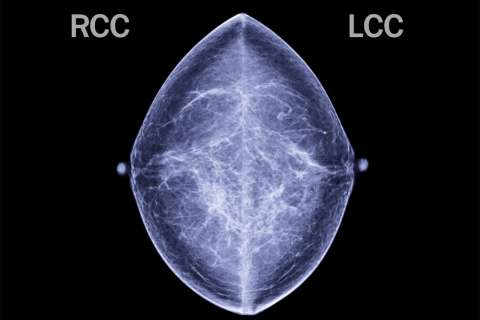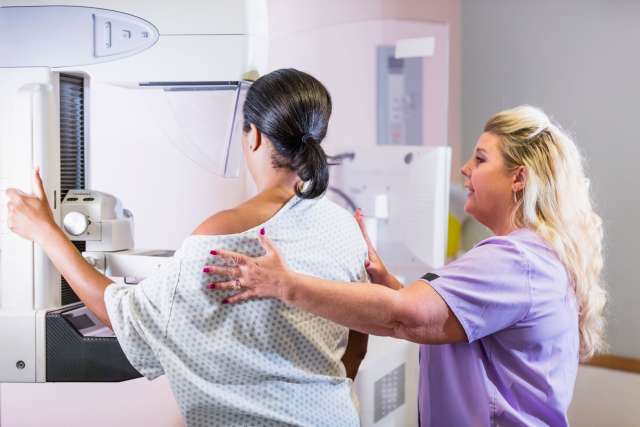This past January, breast-imaging radiologists at UCLA began noticing an unusual pattern in routine screening mammograms: abnormally enlarged lymph nodes in the armpit, a potential sign of cancer. But, in most cases, these enlarged nodes were not suspicious for cancer. When the radiologists called patients to gather additional information, they discovered that many of the women had recently received a COVID-19 vaccine in the corresponding arm that led to the swelling, what is known as axillary lymphadenopathy.
“The most important thing to know is that this is a normal response, showing that your immune system is doing what it is supposed to be doing to protect you against COVID,” says UCLA radiologist Melissa Joines, MD.

Indeed, other vaccines, including those for shingles, pneumonia, tetanus and even the flu, can cause similar immunogenic reactions seen on breast imaging. Not all women will have axillary lymphadenopathy after a vaccine, and many may not notice the swelling that can be seen on imaging.
Radiologists realized two things were drastically different and contributing to the increase. “Because of the rapid mass vaccination of our population, we were seeing more cases. And the COVID-19 vaccines seem to initiate a stronger immune reaction than some of the other vaccines,” Dr. Joines explains.
Clinicians across the country picked up the same pattern, and the national Society for Breast Imaging’s Patient Ca re a nd Delivery Committee issued new guidelines that addressed the temporary lymph node en la rgements a nd “ fa lse posit ives” i n mammograms after COVID-19 vaccines. With regard to scheduling, it recommended: “If possible, and when it does not unduly delay care, consider scheduling screening exams prior to the first dose of a COVID-19 vaccination or four-to-six weeks following the second dose of a COVID-19 vaccination.”
UCLA breast surgeon Deanna J. Attai, MD, emphasizes those recommendations apply for women undergoing routine screening mammograms once a year or every other year if they are not high risk and no problems are suspected. “This does not apply to women undergoing diagnostic imaging when an actual problem exists — when they feel a lump, are experiencing pain, have nipple discharge or other symptoms,” Dr. Attai says. “Those women should schedule their diagnostic mammograms as soon as possible, regardless of the timing of the COVID-19 vaccine.”
Additionally, because routine cancer s c re en i ngs , i nc lud i ng m a m mog r a m s , plummeted during the pandemic, UCLA physicians recommend that women overdue for routine mammograms schedule them as soon as they are able. “It’s important to stress that getting a screening mammogram ensures that breast cancer can be detected as early as possible,” says UCLA radiologist Hannah Milch, MD. And if you already have one scheduled, UCLA’s radiologists recommend keeping the appointment, as it may be difficult to reschedule later as radiology departments see an uptick in screenings.
The doctors stress that the same is also true for the COVID-19 vaccine, and they advise that no one should reschedule their COVID-19 vaccine appointments, and that completing the vaccine regimen as soon as possible is critical.
Over the past months, radiologists have become more skilled in recognizing the possibility of vaccine-induced swelling. Breast-imaging technologists now document a patient’s vaccination dates, as well as in which arm it was given. If the technologist doesn’t ask for the information, the doctors encourage patients to offer the information and ask that it be added to their chart. If the patient received the two-shot Pfizer or Moderna vaccine, it is important to note whether or not it has been one or two doses. This is key information that will be considered by the radiologists when reading the mammograms, Dr. Milch says. Another tip: If there is a history of breast cancer, the radiologists recommend receiving the vaccine in the opposite arm or, if possible, in the gluteal region to avoid any potential issues.
“It’s important to stress that getting a screening mammogram ensures that breast cancer can be detected as early as possible.”
“As the months have gone by, we have become more familiar with this issue,” Dr. Joines adds. “And having a prominent lymph node in and of itself without a clinically or mammographically suspicious breast mass is a rare manifestation of breast cancer.”
Additionally, the doctors stress that there is no correlation between the COVID-19 vaccine and breast cancer. “When this first started to hit the medical and the lay press, some of the headlines implied that there was a link between the vaccines and breast cancer,” Dr. Attai says. “An enlargement of the lymph nodes in imaging can sometimes be a concerning finding, but there appears to be no link between the vaccine and breast cancer. Both the COVID-19 vaccine and mammograms save lives.”


